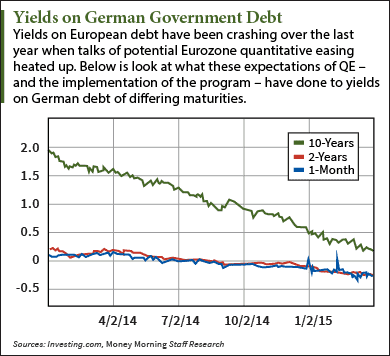 The hunt for yield in Europe is positioning a certain bond ETF for big gains.
The hunt for yield in Europe is positioning a certain bond ETF for big gains.
Right now, Eurozone government bonds are a no-go. Yields are crashing all across the continent and the profit opportunities are drying up. This will only be made worse as the European Central Bank carries on with quantitative easing.
The yields on 10-year sovereign debt are already outrageously low. So low, in fact, that those countries once devastated by the Eurozone debt crisis - including Portugal, Ireland, Italy, and Spain - are all considered a safer bet than the U.S. government.
The yield on the 10-year U.S. Treasury is 1.855% right now. But even Portugal, a country whose banking system was shaken last summer by the split-up of its second largest lender, has yields at 1.704%. Ireland, the second country to receive bailout money after Greece during the Eurozone debt crisis, has 10-year yields at 0.772%.
And that goes without mentioning Germany's 0.195% 10-year, or its -0.249% two-year. Many short-term bonds have negative yields. In addition to Germany, France's two-year is yielding -0.16%, and the Netherlands is yielding -0.194%
This isn't necessarily because these governments' debts are a safer bet than the United States, however. It's because of Eurozone QE.
The ECB's 19-month, trillion-euro infusion promises to flood the banking system with easy money.
Through this program, the ECB and National Central Banks will purchase 50 billion euros a month in member banks' government debt. This on its own should help to put downward pressure on yields.
But it's been happening for a while, in anticipation of the program.
Whispers about QE emerged early last year as disinflation began to take hold in the Eurozone.
Investors assumed that ECB President Mario Draghi would at some point begin large-scale asset purchases, and they wanted to get ahead of the central bank government bond demand.
So they started purchasing.
They assumed central banks would be scouring the secondary markets for these bonds, so investors could turn around and sell them to the central banks once QE took hold. And they were right.
These investors got in while yields were higher. Now that they're careening, the value of these bonds is heading up, and they're making capital gains on Eurosystem purchases.
But this trade is slowly losing its profitability.
Now that yields have fallen so far, investors will be looking elsewhere to chase yield.
And here's the bond ETF that stands to gain...
A Bond ETF with 22% Upside
For safety and yield the best option in the Eurozone is corporate bonds.
And the best bond ETF for this is the SPDR Barclays International Corporate Bond ETF (NYSE Arca: IBND).
"With the questionable health of the European Union, I expect investors will quickly realize there's an alternative bond sector with better yields, which as least pays positive yields," Money Morning Resource Specialist Peter Krauth said. "I think quality European corporate bonds are the next bond subsector to get bid up as investors chase yields. Right now, you still have a chance to get in."
[epom key="ddec3ef33420ef7c9964a4695c349764" redirect="" sourceid="" imported="false"]IBND holds 475 bonds. Of those, 76% are European. The average weighted coupon is 3.81%, while the average maturity is 5.6 years.
To put this in perspective, Portugal - one of the less safe Eurozone debts to hold - has 6-year yields of 1.049%.
Holdings include bonds from big European names like Germany's Deustche Bank, Netherland's Rabobank, and France's BNP Paribas.
As investors see the Eurozone sovereign government debt yields fall, they're going to start fishing for yield in the corporate sector.
And this bond ETF is going to get a boost.
"The International Corporate Bond ETF currently sits about 3% above its 52-week low," Krauth said. "If the shares return to their previous high of $38.05, and I think that's a realistic target, we're looking at a 22% gain from here, on top of any yield."
Looking to magnify your gains in an exchange-traded fund? It might be worth looking elsewhere than those passively managed tracking ETFs. While more volatile, a leveraged ETF is a great way to take even bigger gains on an index or an underlying asset. Here's how...


